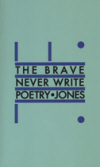The Brave Never Write Poetry
When an artist produces only one piece of work and when the work is anywhere close to stunning, it’s hard not to see it as representational of “promise” and lament what could have been. Daniel Jones authored only one collection of poetry during his lifetime and published it under his last name. Jones was twenty-six when it was published; after The Brave Never Write Poetry was originally published in 1985, he never again published a poem (though he did publish fiction). His sole collection was beautifully republished by Toronto’s Coach House Books in 2011.
When an artist produces only one piece of work and when the work is anywhere close to stunning, it’s hard not to see it as representational of “promise” and lament what could have been. Daniel Jones authored only one collection of poetry during his lifetime and published it under his last name. Jones was twenty-six when it was published; after The Brave Never Write Poetry was originally published in 1985, he never again published a poem (though he did publish fiction). His sole collection was beautifully republished by Toronto’s Coach House Books in 2011.
The strength of Jones’s poems lies in their emotional authenticity. A force of voice and character, reading The Brave Never Write Poetry is a little like reliving an adolescent crush—there is still something irresistible in a bad boy, especially one with literary talent. Jones’s storytelling captivates, and his misanthropy (which we only half-believe) and self-deprecation are wielded like sharp knives, but it is his poetic thoughtfulness, his control of line and pacing, that are mesmerizing.
The first stanza of the poem that opens the book, the collection’s title poem, is a brilliant example:
The brave ride streetcars to jobs
early in the mornings, have traffic accidents,
rob banks. The brave have children, relationships,
mortgages. The brave never write these things
down in notebooks. The brave die & they are
dead
It seems a simple list, but its construction, his movement from a pedestrian “ride streetcars to jobs” through “rob banks” to a quiet “never write things down” is rhythmically entrancing and shows what it means to Jones to be a poet: in a sense, to live forever.
Names and bodies move quickly, in and out of poems, in and out of the collection. Jones is generous in bringing his reader alongside him, and as you pinball through the lines, you feel as if your body, too, is being bruised by all the love affairs falling apart, by the concrete prison walls, by the hospital bed straps, by all the naked bodies. This is what makes the collection—not the dirtiness of life reflected in the appearance of fluids of booze, sex, and insane asylums, but the way in which Jones achieves what the best confessional poets can from language: a strength drawn from vulnerability. In return, he gets our investment without our cynicism.
Jones is not afraid to offend, thumbing his nose at the establishment, at trends in both poetics and theories. There is a timelessness in those he chooses to mock, certain falsities that we recognize in the academy and reality of being “an artist” today. In a longer poem entitled “Jack and Jill in Toronto,” Jones tells the story of a couple, the type of couple who “move into separate apartments but plan / to remain friends: / they both want to be writers / and need their own space.”
Both aspiring poets, the poem begins with Jack and Jill in Toronto attempting to “become poets” and the aesthetic decisions they make in order to do so. It ends with the reality they settle for as an editor and a social worker who “eventually publish / several poems each,” but become “too busy to write.” For good measure, he also takes a swipe at the feminist theories and poetics of the 1980s:
Jill writes poetry,
though she doesn’t like to call herself a poet,
and
she plans to write a series of poems about how
Jack controlled and brutalized her with his thing
If Jones were hating just to hate, it’d be easy to dismiss him. But the art with which he rips apart his targets makes his talent the focus point, and not the insults. Jones’s choice of parable—the original Jack and Jill climb up a hill to fetch a pail of water—does well to describe the couple in the poem, who are climbing up a hill to “become” poets, and then go tumbling down into a rather pedestrian life. The lines in “Jack and Jill in Toronto” sway on the page, highlighting Jones’s ironic tone through controlling the pace with which the reader learns about Jack and Jill, and creating a wonderful, light sense of tumbling, of falling, so gently that it is possible not to notice the falling.
The collection ends with a series of haiku stanzas with the title “Two Cops Kissing.” The first haiku surprises in its stillness and beauty:
After love,
the click of june bugs
against the glass
Jones is back to drug use in the second stanza, and mentions his bowels in the third, but the quiet, haunting lines are the ones that stay with us, that give the reader pause. If this collection did fall through the cracks its first time around, it shouldn’t this time. In our age of reality TV and Facebook oversharing, Jones shows us why confession is so appealing—it is about having lived a life, whatever that life might be. But seeing confession turned into an art? That can be breathtaking.





